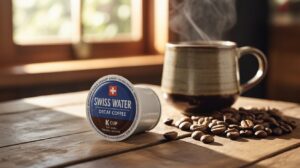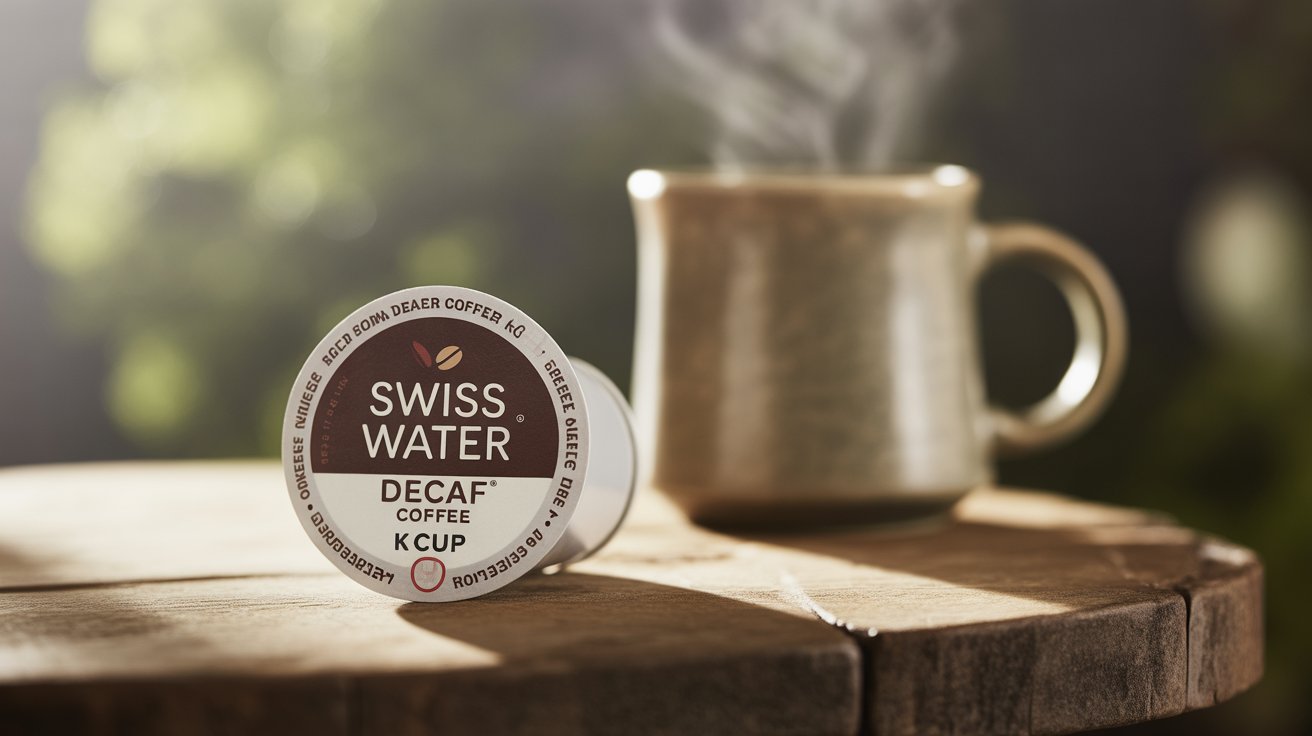If you’ve ever sipped a decaf K-Cup and thought, “Why does this taste flat—or worse, chemical?” you’re not alone. Most decaf pods are processed with harsh solvents that strip both flavor and confidence.
That’s where Swiss Water decaf coffee K-Cup pods change the game. Instead of chemicals, they use pure water, temperature, and time—removing 99.9% of caffeine while keeping the rich, café-style taste intact.
Think about it: a safe, chemical-free cup you can brew in under a minute, without sacrificing flavor or peace of mind. That’s exactly why more health-conscious coffee lovers are making the switch.
In this guide, you’ll learn how the Swiss Water process works, why it’s different, and which K-Cups are actually worth your money.
What Makes Swiss Water K-Cups Unique?
When you’re buying decaf, the process matters just as much as the beans. Most decaf pods rely on solvents like methylene chloride or ethyl acetate. Swiss Water K-Cups skip the chemicals and still deliver a cup that tastes like the real deal.
The Swiss Water Process Explained
The Swiss Water® Process removes caffeine using only three things: water, temperature, and time. No solvents. No chemicals. Just science and patience.
Here’s how it works in four steps (imagine this as a simple infographic):
Soak the beans in hot water to draw out caffeine and flavor compounds.
Filter through activated carbon, which traps caffeine but leaves flavor-rich compounds intact.
Reintroduce the beans to the now “flavor-charged” water, so they reabsorb the natural oils and aromas.
Dry and roast—resulting in beans that are 99.9% caffeine-free but still bursting with taste.
This method has been perfected since the 1930s and is now used by respected roasters like Copper Moon Coffee, Kicking Horse Coffee, and dozens of specialty brands worldwide. According to Wikipedia, the process consistently delivers coffee that meets FDA’s decaf standard (97% caffeine removed) but often exceeds it.
Why K-Cups Matter for Convenience & Taste
K-Cups make that same solvent-free process accessible in seconds. Pop in a pod, hit brew, and you get:
Freshness: Sealed pods lock in the delicate flavors preserved by Swiss Water.
Compatibility: Works with most Keurig and single-serve brewers.
Precision: No measuring, no waste—just a reliable cup every time.
For busy mornings or late-night cravings, this is how health-conscious coffee drinkers enjoy premium decaf without hassle.
Health & Environmental Advantages
Swiss Water K-Cups don’t just taste better—they feel better.
Chemical-free: No methylene chloride, no ethyl acetate—just clean water.
Low residual caffeine: Tests show <0.1% caffeine remains, far below the FDA minimum.
Organic options: Many Swiss Water brands carry USDA Organic and Fair Trade certifications.
Eco-conscious demand: According to Mordor Intelligence and Growth Market Reports, the global decaf coffee market is expanding steadily (CAGR ~6%), fueled by consumer preference for “clean label” and solvent-free beverages.
For anyone with health sensitivities—or who just wants peace of mind—this is the safest decaf option on the shelf.
Taste & Quality Compared: Swiss Water K-Cups vs Other Decaf Methods

Not all decaf is created equal. The method you choose directly affects taste, aroma, and even your budget.
Flavor Retention & Aroma Differences
Swiss Water: Clean, rounded flavor; preserves much of the bean’s natural profile.
Solvent (Methylene Chloride): Efficient, but can strip brightness and leave a flat finish.
CO₂ Method: Great for maintaining complexity, but often costly.
Ethyl Acetate (a.k.a. “natural” decaf): Marketed as fruit-derived, but still solvent-based.
Real-world feedback backs this up. One Reddit user summed it up perfectly: “Swiss Water seems to impart the most flavor, rather than simply stripping it.” Others note subtle fruitiness loss, but overall agree it’s superior to chemical methods.
Residual Caffeine Reality
The FDA requires that decaf coffee remove at least 97% of caffeine. Swiss Water often achieves 99.9%, meaning less than 2 milligrams per cup (vs 95+ mg in regular coffee).
For context: that’s less caffeine than a square of dark chocolate. (Source: Wikipedia, Swiss Water Coffee Company).
Cost Trade-Offs & Market Trends
Yes, Swiss Water pods cost more than standard decaf K-Cups. But here’s why many consider it worth it:
Higher flavor retention → premium experience.
Chemical-free peace of mind → growing consumer priority.
Organic & Fair Trade options → align with ethical consumption trends.
The UC Davis Food & Health Institute notes a steady increase in demand for solvent-free decaf, while Mordor Intelligence projects organic decaf as one of the fastest-growing coffee segments globally.
In short: you’re paying slightly more for quality, safety, and trust—and consumers are voting with their wallets.
Swiss Water Decaf K-Cup Buying Guide
Decaf isn’t just “decaf.” The right K-Cup can mean the difference between a smooth, full-bodied cup and one that tastes flat. Here’s how to pick wisely.
What to Look for on the Label
Every great Swiss Water K-Cup starts with a clear label. Don’t skip this step:
Swiss Water® Seal → Guarantees the beans were decaffeinated with the chemical-free Swiss Water Process.
Organic Certification → USDA Organic or Fair Trade means no synthetic pesticides, plus ethical sourcing.
Low Acid Claims → Helpful if you have a sensitive stomach. Brands like HealthWise Coffee specifically market low-acid options.
Roast Level → Light roasts = brighter, fruitier flavors; dark roasts = bold, chocolatey notes.
Pro tip: If the label doesn’t mention the Swiss Water Process, assume it’s solvent-based.
Top Brands & Where to Buy
Not all pods are created equal. Here are the standouts you’ll actually find online or in stores:
HealthWise Coffee – Low-acid, Swiss Water, popular with sensitive stomach drinkers.
Copper Moon Coffee – Smooth medium roasts, widely sold on Amazon.
Salt Creek Coffee Co. – Small-batch Swiss Water pods with organic certification.
Kirkland Signature (Costco) – Affordable bulk option, great balance of cost and quality.
Here’s a quick comparison:
| Brand | Roast Options | Certifications | Price Range | Best Place to Buy |
|---|---|---|---|---|
| HealthWise Coffee | Medium | Low-Acid, Swiss Water | $$ | HealthWise website |
| Copper Moon | Light–Medium | Swiss Water | $$ | Amazon |
| Salt Creek Coffee | Medium–Dark | Organic, Swiss Water | $$$ | Salt Creek Coffee Co |
| Kirkland (Costco) | Medium–Dark | Swiss Water | $ | Costco |
Subscription vs Single Purchase
Deciding between one-off orders and subscriptions comes down to convenience vs control.
Subscriptions: Save ~10–15%, never run out, and lock in freshness. Ideal for daily decaf drinkers.
Single Purchase: More flexibility, better for casual drinkers or those still experimenting with brands.
Pro tip: If you brew more than one pod a day, subscriptions almost always pay for themselves within a month.
Read Also:
Brewing Swiss Water K-Cups for Best Flavor
Buying the right pod is half the battle. Brewing it right is what makes the difference in your cup.
Expert Tips & Use Cases
Small tweaks can make your decaf taste dramatically better:
Water Temperature → Use filtered water at ~195–205°F. Keurig brewers handle this automatically, but starting with good water is key.
Brew Time → Select the smaller cup setting (6–8 oz) for bolder flavor; larger settings often dilute the taste.
Pod Storage → Keep pods in a cool, dry place, away from light and humidity. Freshness matters.
Use cases where Swiss Water pods shine:
Morning Energy Without Jitters → One Copper Moon Coffee customer said: “It’s smooth enough for mornings, but I never feel wired.”
Sensitive Stomachs → Low-acid Swiss Water pods like HealthWise minimize reflux or discomfort.
Late-Night Rituals → Brew a dark roast pod as an evening dessert pairing without losing sleep.
Common Mistakes to Avoid
Even good pods can taste bad if brewed wrong. Avoid these pitfalls:
Over-Extraction → Brewing a pod twice leads to bitter, watery coffee.
Using Old Pods → Stale pods lose oils and aroma fast. Buy in 1–2 month supply, not bulk for a year.
Wrong Settings → Always match the pod to the right ounce setting. A 12 oz brew usually means “weak decaf.”
Real Insights & FAQs from Decaf Lovers
When people switch to Swiss Water decaf, the first thing they ask is: does it actually taste like real coffee? The short answer: yes—if you choose the right pod and brew it correctly.
Real-World Feedback
Reddit threads and coffee forums tell the story best. One user wrote:
“This method seems to impart the most flavor, rather than simply stripping flavor…”
That comment sums up why Swiss Water resonates with decaf drinkers. Unlike solvent-based decaf, it preserves oils and aromatics. Baltimore Coffee and Tea notes that Swiss Water beans consistently rank higher in blind taste tests compared to traditional decaf methods.
Real buyers also highlight:
Flavor retention → closer to regular coffee.
Digestive comfort → less reflux for low-acid brands like HealthWise.
Peace of mind → no chemical solvents, verified by the Swiss Water® Process itself.
Common FAQs
Is Swiss Water really chemical-free?
Yes. The process uses only water, time, and temperature—no methylene chloride or ethyl acetate.
How much caffeine remains?
Roughly 97% is removed. Expect ~2–5 mg per 8 oz cup (vs ~95 mg in regular coffee).
Is it Kosher?
Yes. Brands such as Baltimore Coffee and Tea and Swiss Water Decaf list Kosher certification in their product specs.
Is it worth the premium price?
If you care about taste, stomach comfort, and chemical-free assurance, most users say yes. Bulk options like Costco’s Kirkland Signature make the cost-per-cup highly competitive.
Final Verdict & Buyer Checklist
At the end of the day, Swiss Water decaf K-Cups are about trust, flavor, and fit. Use this quick filter before you buy:
Quick Decision Checklist
Does the label display the Swiss Water® seal?
Is it organic or Fair Trade certified?
Does it specify low acid (if you need stomach-friendly options)?
What’s the roast level (light, medium, dark)?
Price per cup: bulk box vs single box vs subscription?
Who This Is Best For
Swiss Water decaf K-Cups are perfect for:
Health-conscious drinkers → no solvents, fewer acids.
People with reflux or sensitive stomachs → brands like HealthWise and Salt Creek.
Single-serve convenience lovers → effortless pod brewing at home or office.
Quality-focused buyers → willing to pay slightly more for cleaner flavor and certifications.

Shahriar brings a unique blend of storytelling prowess and digital expertise to Daily Coffee Guide. With a background in SEO and content strategy, he ensures our articles on Beans, Coffee, Tea, and Drinks are both engaging and discoverable. His passion for coffee culture drives him to explore and share the rich narratives behind every cup.

